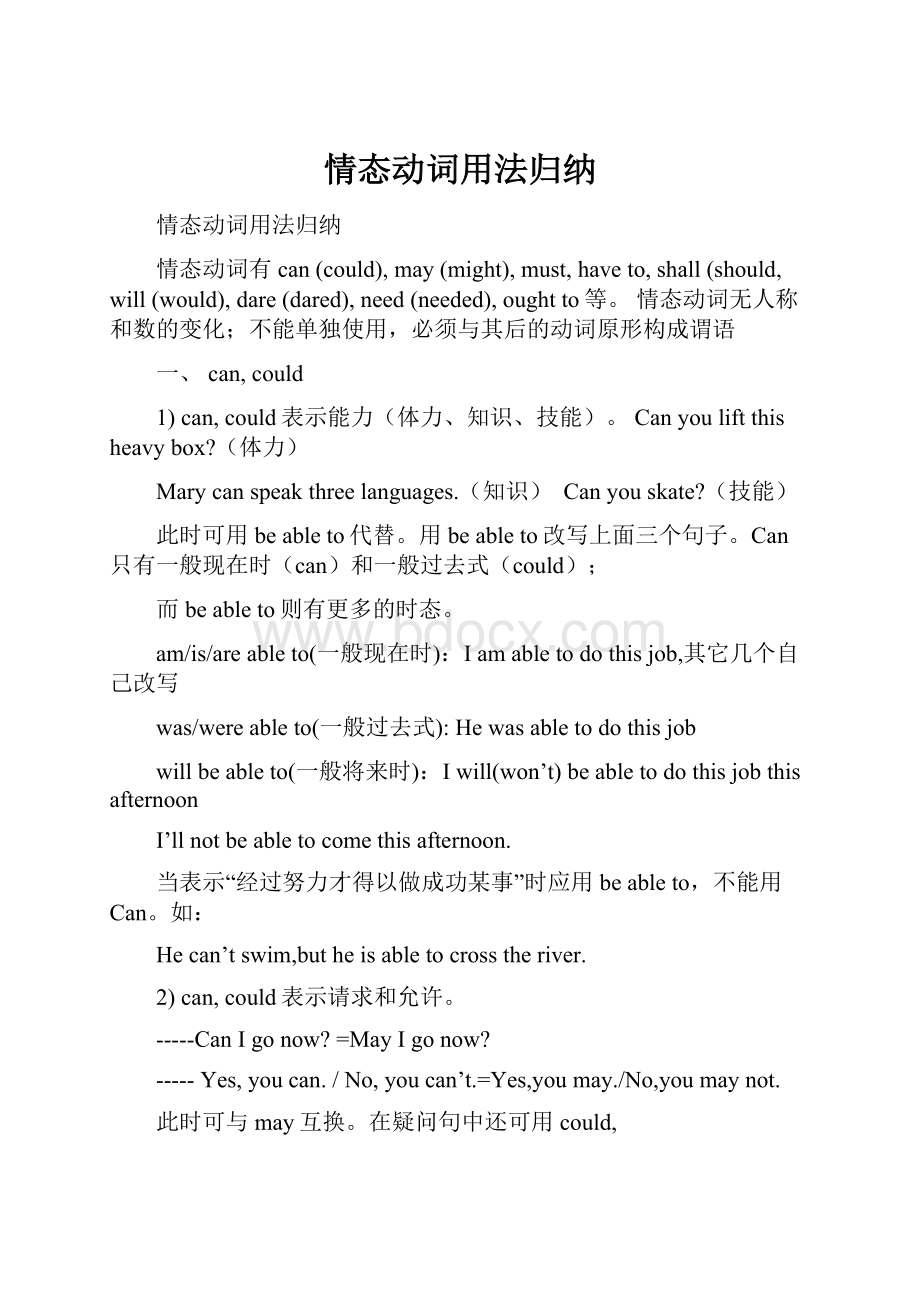情态动词用法归纳.docx
《情态动词用法归纳.docx》由会员分享,可在线阅读,更多相关《情态动词用法归纳.docx(15页珍藏版)》请在冰豆网上搜索。

情态动词用法归纳
情态动词用法归纳
情态动词有can(could),may(might),must,haveto,shall(should,will(would),dare(dared),need(needed),oughtto等。
情态动词无人称和数的变化;不能单独使用,必须与其后的动词原形构成谓语
一、can,could
1)can,could表示能力(体力、知识、技能)。
Canyouliftthisheavybox?
(体力)
Marycanspeakthreelanguages.(知识)Canyouskate?
(技能)
此时可用beableto代替。
用beableto改写上面三个句子。
Can只有一般现在时(can)和一般过去式(could);
而beableto则有更多的时态。
am/is/areableto(一般现在时):
Iamabletodothisjob,其它几个自己改写
was/wereableto(一般过去式):
Hewasabletodothisjob
willbeableto(一般将来时):
Iwill(won’t)beabletodothisjobthisafternoon
I’llnotbeabletocomethisafternoon.
当表示“经过努力才得以做成功某事”时应用beableto,不能用Can。
如:
Hecan’tswim,butheisabletocrosstheriver.
2)can,could表示请求和允许。
-----CanIgonow?
=MayIgonow?
-----Yes,youcan./No,youcan’t.=Yes,youmay./No,youmaynot.
此时可与may互换。
在疑问句中还可用could,
might代替,不是过去式,只是语气更委婉,不能用于肯定句和答语中。
----CouldIcometoseeyoutomorrow?
----Yes,youcan.(No,I’mafraidnot.)
3)表示客观可能性(客观原因形成的能力)。
They’vechangedthetimetable,sowecangobybusinstead.
Thishallcanhold500peopleatleast.
4)表示推测(惊讶、怀疑、不相信的态度),用于疑问句、否定句和感叹句中。
Canthisbetrue?
Thiscan’tbedonebyhim.Howcanthisbetrue?
二、may,might
1)表示请求和允许。
might比may语气更委婉,而不是过去式。
否定回答时可用can’t
或mustn’t,表示“不可以,禁止”。
----Might/MayIsmokeinthisroom?
----No,youmustn’t.
----May/MightItakethisbookoutoftheroom?
----Yes,youcan.(No,youcan’t/mustn’t.)
用MayI...?
征徇对方许可时比较正式和客气,而用CanI...?
在口语中更常见。
2)用于祈使句,表示祝愿。
Mayyousucceed!
3)表示推测、可能性(不用于疑问句)。
might不是过去式,它所表示的可能性比may小。
1.Hemay/mightbeverybusynow.
2.Yourmothermay/mightnotknowthetruth.
三、must,haveto
1)表示必须、必要。
Youmustcomeintime.
在回答引出的问句时,如果是否定的,不能用mustn’t(禁止,不准),而用needn’t,don’thaveto(不必).
----Mustwehandinourexercisebookstoday?
----Yes,youmust.
----No,youdon’thaveto/youneedn’t.
2)must是说话人的主观看法,而haveto则强调客观需要。
Must只有一般现在时,haveto有更多的时态形式。
1.heplayisn’tinteresting,Ireallymustgonow.
2.IhadtoworkwhenIwasyourage.
3)表示推测、可能性(只用于肯定的陈述句)
1.You’reTom’sgoodfriend,soyoumustknowwhathelikesbest.
2.Yourmothermustbewaitingforyounow.
四、dare,need
1)dare作情态动词用时,常用于疑问句、否定句和条件从句中,过去式形式为dared。
1.HowdareyousayI’munfair?
2.Hedaren’tspeakEnglishbeforesuchacrowd,darehe?
3.Ifwedarednotgotherethatday,wecouldn’tgetthebeautifulflowers.
2)need作情态动词用时,常用于疑问句、否定句。
在肯定句中一般用must,haveto,oughtto,should代替。
1.Youneedn’tcomesoearly.
2.----NeedIfinishtheworktoday?
----Yes,youmust./No,youneedn’t.
3)dare和need作实义动词用时,有人称、时态和数的变化。
在肯定句中,dare后面常接带to的不定式。
在疑问句和否定句中,dare后面可接带to或不带to的不定式。
而need后面只能接带to的不定式。
1.Idaretoswimacrossthisriver.
2.Hedoesn’tdare(to)answer.
3.Heneedstofinishhishomeworktoday.
五、shall,should
1)shall用于第一人称,征求对方的意见。
Whatshallwedothisevening?
2)shall用于第二、三人称,表示说话人给对方的命令、警告、允诺或威胁。
1.Youshallfailifyoudon’tworkhard.(警告)
2.HeshallhavethebookwhenIfinishit.(允诺)
3.Heshallbepunished.(威胁)
六、will,would
1)表示请求、建议等,would更委婉。
Will/Wouldyoupassmetheball,please?
2)表示意志、愿望和决心。
1.Iwillneverdothatagain.
2.Theyaskedhimifhewouldgoabroad.
3)would表示过去反复发生的动作或某种倾向。
would表示过去习惯时比usedto正式,且没有“现已无此习惯”的含义。
1.Duringthevacation,hewouldvisitmeeveryotherday.
2.Thewoundwouldnotheal.
4)表示估计和猜想。
Itwouldbeaboutteno’clockwhenshelefthome.
七、should,oughtto
1)should,oughtto表示“应该”,oughtto表示义务或责任,比should语气重。
1.Ishouldhelpherbecausesheisintrouble.2.Yououghttotakecareofthebaby.
2)表示劝告、建议和命令。
should,oughtto可通用,但在疑问句中常用should。
1.Youshould/oughttogotoclassrightaway.2.ShouldIopenthewindow?
3)表示推测should,oughtto(客观推测),must(主观推测)。
1.Hemustbehomebynow.(断定他已到家)2.Heoughtto/shouldbehomebynow.(不太肯定)
3.Thisiswheretheoilmustbe.(直爽)4.Thisiswheretheoiloughtto/shouldbe.(含蓄)
八、情态动词+不定式完成式(havedone)
1)can/could+havedone在肯定句中表示“本来可以做而实际上能做某事”,是虚拟语气;在疑问句或否定句中表示对过去行为的怀疑或不肯定,表示推测。
1.Youcouldhavedonebetter,butyoudidn’ttryyourbest.(虚拟语气)
2.Hecan’thavebeentothattown.(推测)3.Canhehavegotthebook?
(推测)
2)may/might+不定式完成式(havedone)
表示对过去行为的推测。
不能用于疑问句中,没有虚拟语气的用法。
Might所表示的可能性比may小。
1.Hemaynothavefinishedthework.2Ifwehadtakentheotherroad,wemighthavearrivedearlier.
3)must+不定式完成式(havedone)
用于肯定句中,表示对过去行为的推测。
意为“一定、想必”。
其疑问、否定形式用can,can’t代替。
参看1)can/could+havedone表示推测。
1.YoumusthaveseenthefilmTitanic.2HemusthavebeentoShanghai.
4)should+不定式完成式(havedone)
用于肯定句中,表示对过去行为的推测。
Heshouldhavefinishedtheworkbynow。
表示“本应该做而实际上没有做某事”,其否定式表示某种行为本不该发生却发生了。
可以与oughtto+不定式完成式(havedone)互换。
1.Yououghtto/shouldhavehelpedhim.(butyoudidn’t.)
2.Sheshouldn’thavetakenawaymymeasuringtape,forIwantedtouseit.
5)needn’t+不定式完成式(havedone)
表示“本来不必做而实际上做了某事”。
Youneedn’thavewateredtheflowers,foritisgoingtorain.
6)will+不定式完成式(havedone)
主要用于第二、三人称,表示对已完成的动作或事态的推测。
Hewillhavearrivedbynow
情态动词也可以和动词进行形式或完成进行形式构成谓语:
表示“应当正在……”,“想必正在……”的意思。
Whyshouldwebesittingheredoingnothing?
Shemightstillbethinkingaboutthequestionyouraised.
Hecan'tbeswimminginsuchweather.
Atthemomentshemay(might)beplayingwithherschoolmates.
Weneedn'tbestandinghereintherain.Wemighttakeshelterinthehutoverthere.
情态动词间或也可以和一个动词的完成进行形式构成谓语,表示“应当一直在……”,“想必一直在……”这类意思。
【例如】
Theyaresweatingallover.Theymusthavebeenworkinginthefields.
Theymayhavebeendiscussingtheproblemthismorning.
Shecouldn'thavebeenswimmingallday.
情态动词部分练习题
1)You____allthoseclothes!
Wehaveawashingmachinetodothatsortofthing
A)needn'thavewashed B)shouldn'thavewashed C)mustnothavewashedD)cannothavewashed
2)John'sscoreonthetestisthehighestintheclass;he____lastnight.
A)shouldstudyB)shouldhavestudied C)musthavestudied D)musthavetostudy
3)Theroomisinaterriblemess;it____cleaned.(CET-4,1996,6)
A)can'thavebeenB)shouldn'thavebeenC)mustn'thavebeenD)wouldn'thavebeen
4)Nobodyknowshowpeoplefirstcametotheseislands.They____fromSouthAmericaonrafts.
A)musthavesailedB)cansail C)mighthavesailed D)shouldhavesailed
5)Marywasnotinherbedroomyesterdayafternoon.She____inherclassroom.
A)shouldhavebeenB)musthavebeen C)mustbeD)shouldbe
6)Bobsaidhewasgoingtojoinourclubbuthedidn't.He____hismind.
A)can'thavechanged B)wouldn'thavechangedC)musthavechangedD)shouldn'thavechanged
7)You____totowntoseethefilmyesterday.ItwillbeonTVtonight.
A)needn'tgo B)hadbetternotgoC)shouldnotgo D)needn'thavegone
8)We____theletteryesterday,butitdidn'tarrive.
A)mustreceive B)oughttoreceiveC)musthavereceived D)oughttohavereceived
9)Withalltheworkonhand,he____tothecinemalastnight.
A)mustn'tgo B)shouldn'thavegoneC)couldnotgo D)couldn'thavegone
10)Evewaslateforclassagain.She____earlier.
A)shouldgetupB)mustgetupC)needtogetupD)shouldhavegotup
11)Iamfeelingsick.I____somuchchocolate.
A)needn'thaveeate B)couldn'thaveeaten C)mustn'thaveeatenD)shouldn'thaveeaten
12)Ididn'tsendoutmyapplicationformlastweek,butI____.
A)had B)woulddo C)shouldhaveD)mighthaveto
13)Walkingaloneinthedesertedvillage,Johnwasscared.Hethoughthe____Tomtogowithhim.
A)mighthaveasked B)shouldasked C)musthaveasked D)shouldhaveasked
14)WhenIgottothecinema,thefilmhadalreadystarted;I____thereearlier.
A)oughttoget B)oughttohavegot C)musthavegotD)mustget
15)Theroadwasmuddy.It____lastnight.
A)mustrained B)musthaverained C)mustberained D)couldhaverained
16)ShecanspeakquitefluentEnglish.She____.
A)mustbeenintheU.S.A.forsometime B)musthavebeenintheU.S.A.forsometime
C)shouldhavebeenintheU.S.A.forsometime D)MaybeintheU.S.A.forsometime
17)Youshouldbearinmindthatheisnotsostrongashe____.
A)wasusedtobe B)usedtobe C)wasusedto D)useto
18)“Wedidn'tseehimattheexhibitionyesterday.”“He___it.”
A)mustn'tvisitB)can'thavevisitedC)shouldhavegonetose D)maysee
19)Mary____myletter,otherwiseshewouldhaverepliedbeforenow.
A)shouldhavereceived B)hasreceivedC)Couldn'thavereceived D)oughttohavereceived
20)I____youavaluablepresentforyourbirthday,butIwasshortofmoney.
A)wouldhavelikedtogive B)likedtogive C)havelikedtogive D)wouldliketogive
21)“Where____myumbrella?
”“Somebody____itawaybymistake.”
A)is,musthavetaken B)is,musttake C)havebeen,musttakeD)is,takes
22)What____wouldhappenifthedirectorknewyoufeltthatway?
A)willyousupposeB)yousuppose C)doyousuppose D)youwouldsuppose
23)Twoeyes____seemorethanone.
A)can B)mayC)willD)should
24)____youcontinueinyoureffortsandachievenewandgreatersuccesses.
A)Would B)Will C)MayD)Should
25)Weoughttohelpeachotherinourwork,____?
A)oughtn'twe B)shouldwe C)shouldn'twe D)oughttowe
26)Tom____betterthantoaskDickforhelp.
A)shallknow B)shouldn'tknowC)hasknown D)shouldhaveknown
27)You____yourtoothpulledoutbeforeitrotcompletely.
A)hadbettergot B)hadtogetbetter C)hadbettertoget D)hadbetterget
28)Whenwegottothecinema,thefilmhasn'tstartedyet,sowe____.
A)needn'thurry B)didn'tneedhurryC)needn'ttohurry D)needn'thavehurried
29)Itwasreallyverydangerous;you____